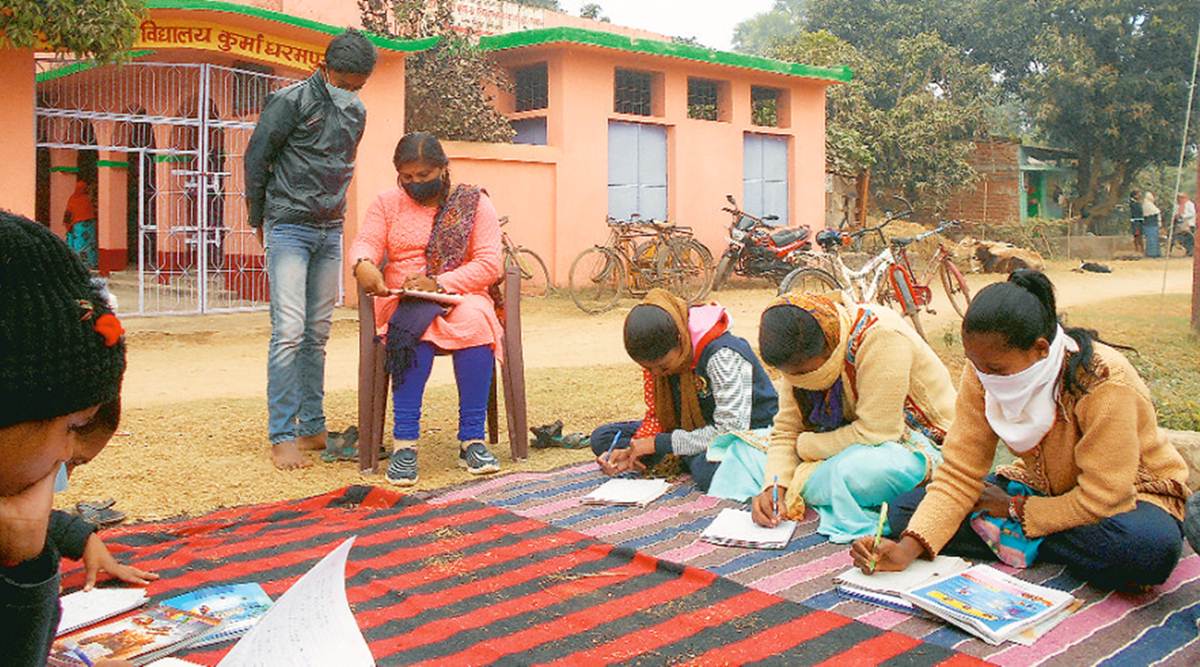 Schools shut, Khushabu, a teacher, has started taking classes by the roadside. (Express photo by Dilkhush Kumar)
Schools shut, Khushabu, a teacher, has started taking classes by the roadside. (Express photo by Dilkhush Kumar) A GROUP of children sit on a carpet by the road outside the two-storied government middle school in this village in Banka district of Bihar as Khushabu Kumari, their English teacher, pores over notebooks of her students.
It is not an unusual sight in these Covid times, especially in the rural areas.
Schools have remained shut for students since March last year. Although teachers can come, they are not allowed to teach in the school. So, the classes have moved out of schools – at times to the teachers’ homes or open spaces outside the students’ homes. And at times, by the roadside, like in Dharampur, a village of more than 400 households, mostly from Scheduled Caste and Other Backward Classes communities.
“This is the only way I can do my bit to educate some children in this unprecedented crisis… We do not have enough administrative work at school. But there are only a handful of students who show interest in getting guidance from teachers,” says Khushabu.
She says there is still lack of awareness among most children and their parents about education in the absence of schooling.
Apart from the middle school, Utkramit Madhya Vidyalaya, there is a primary school at the other end of the village. The nearest high school is at Kurmadih village, 4.5 km away.
Khushabu, who joined as an assistant teacher on contract basis in 2014, says there are nine teachers in her school, including headmaster Ganesh Prasad Thakur. Three other teachers, Neeta Kumari, Juli Kumari and Gasiya Parbeen, have also been pitching in to guide the students in these off-school days.
Khushabu says although some parents send their children to private tutors, there is no replacement for schooling.
Mani Mohan Singh, a villager, agrees. “Schools are schools. One can send the child to a private tutor for one hour. What about the other 23 hours of the day?”
In this village, where almost 90 per cent of population are either share-croppers or daily-wage workers, online classes are an urban privilege. Khushabu says most parents cannot afford smartphones and Internet connectivity is poor as well – reasons which have widened the urban-rural learning gap.
“The parents’ concerns are genuine. Most parents cannot afford smartphones. Besides, Internet connection is very poor. We wish to make a WhatsApp group for students but for poor net connectivity,” says the 34-year-old teacher.
But she is happy with increasing awareness among her girl students. “I, as a teacher, am very happy that girls find out ways to seek guidance from us even when their guardians are barely taking any initiative,” says Khushabu, mother of a 5-year-old boy. “Girls have been also instrumental in encouraging boys to approach teachers.”
Yet, there is a long way to go. As the school remains closed, less than 10 per cent of the 392 students have reached out to the teachers. In the pre-Covid days, attendance used to be fairly good at 70-75 per cent.
According to Khushabu, the schooling programme on national broadcaster Doordarshan could be put to better use. “There can be better use of ‘Mera Doordarshan, Mera Vidyalaya’ programme to spread more awareness among students and parents. Although we are asked to give feedback on the courses being taught on Doordarshan in these Covid days, the onus is on the students to make it successful,” she says. Three of her students – Ambika Kumari, Barsha Kumari and Asha Kumari – nod in agreement.
Ambika, however, says education through television is one-way. “Such courses are only fillers and can be a good top-up to regular classes. We need buzzing classes all over again. We miss school, teachers, their care and reprimands,” says the 13-year-old, whose father Ashok Kumar Singh is a provision store owner.
She is eager to enter class again.
Several parents and guardians suggest the teachers should take classes in batches of 10 on rotation.
Some parents want to know when Covid vaccine would be ready for the children. Though most villagers do not use masks, they want all the children vaccinated soon so that regular schooling resumes without any worries.
Headmaster Thakur says, “It does not look nice that we come to school but are not allowed to teach. We are also keen on resuming teaching.”